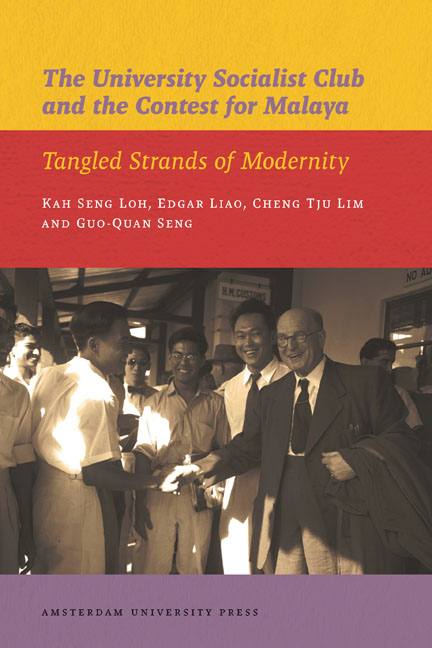Book contents
- Frontmatter
- Dedication
- Contents
- Acknowledgments
- List of Photographs
- Abbreviations
- 1 The Socialist Club and the Modernity Project
- 2 Awake in the Bowl of Night
- 3 The Fajar Trial
- 4 Visionary of the Nation, Voice of Stifled Malayans
- 5 A Beacon of Light on the Campus and Beyond
- 6 Frankly Partisan in the Struggle for Student Leadership
- 7 The Shadow over the Club
- 8 Resisting Malaysia, Swansong for Malaya
- 9 Long Night after Coldstore
- 10 In Defence of University Autonomy and Student Rights
- 11 Entwined Memories and Myths
- Conclusion: Modernity in Singapore and Malaya Reconsidered
- The University Socialists: Biographical Sketches
- Timeline of Events
- Notes
- Bibliography
- Index
- Publications Series
2 - Awake in the Bowl of Night
Published online by Cambridge University Press: 21 January 2021
- Frontmatter
- Dedication
- Contents
- Acknowledgments
- List of Photographs
- Abbreviations
- 1 The Socialist Club and the Modernity Project
- 2 Awake in the Bowl of Night
- 3 The Fajar Trial
- 4 Visionary of the Nation, Voice of Stifled Malayans
- 5 A Beacon of Light on the Campus and Beyond
- 6 Frankly Partisan in the Struggle for Student Leadership
- 7 The Shadow over the Club
- 8 Resisting Malaysia, Swansong for Malaya
- 9 Long Night after Coldstore
- 10 In Defence of University Autonomy and Student Rights
- 11 Entwined Memories and Myths
- Conclusion: Modernity in Singapore and Malaya Reconsidered
- The University Socialists: Biographical Sketches
- Timeline of Events
- Notes
- Bibliography
- Index
- Publications Series
Summary
The University Socialist Club was formed on 21 February 1953 at an inaugural meeting held at the Physics Lecture Theatre on the Bukit Timah campus of the University of Malaya in Singapore. This was an important moment for the various nationalist groups that would emerge to contest for the shape of modernity in Singapore and Malaya in the 1950s and 1960s. For left-wing socialists, the Club represented a valuable opportunity to propagate socialist thought and carry out socialist activities on campus and beyond. However, the Club was confronted by two realities which were to constrain the reach of its radicalism. The first was that in the first year of its existence, the Club's membership was mixed, comprising both reformist and left-wing socialists and giving rise to internal dissension.
This inner conflict, while temporary, was an intended part of the second reality. At the state level, the Socialist Club really owed its creation to colonial endorsement. While the university students had strongly pushed for its formation, the university authorities envisaged the Club as a political club in the British liberal tradition, namely, as a society for political discussion and debate. The Club was intended as part of the relaunch of the Malayan Spring experiment of 1945-1948. The original British-sponsored, liberal-democratic endeavour to determine the future shape of post-colonial Singapore and Malaya had ended in insurgency and martial law on the peninsula, although the Emergency's grip on Singapore was weaker. The birth of the Club was a prelude to constitutional reforms the British regime would carry out in Singapore from the mid-1950s, allowing for greater political openness, a degree of self-rule for the elected government, and most importantly, the political framework for different modernist-nationalist groups to emerge, combine, grow, or to be contained. Even as the Club developed and expanded its activism in subsequent years, it remained under the shadow of this framework, from which bounds it never really extricated itself.
Between the Emergency and Orderly Decolonisation
Change along modernist lines was basic to the tenor of Singapore and Malaysian politics after World War II. The first phase of the Malayan Spring between 1945 and 1948 was a period of relative political and cultural liberalism which permitted the emergence of a left-wing mass movement on both sides of the causeway.
- Type
- Chapter
- Information
- The University Socialist Club and the Contest for MalayaTangled Strands of Modernity, pp. 41 - 60Publisher: Amsterdam University PressPrint publication year: 2012



